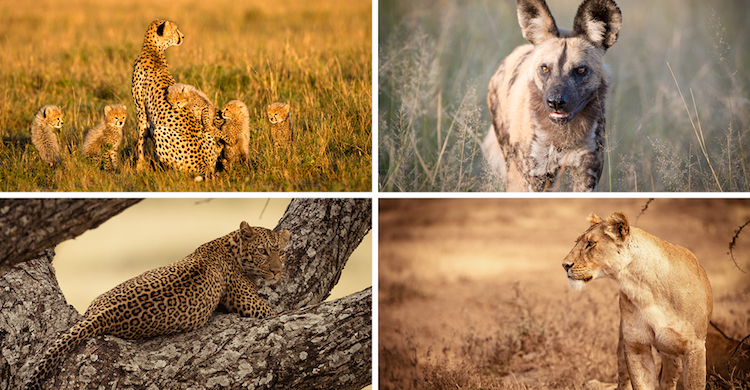By Rita Joshi
BERLIN | BONN (IDN) – More than 30 countries hosting African Wild Dog, Cheetah, Leopard and Lion have agreed on establishing a work programme to guide their conservation actions over the next coming years. The move known as the African Carnivore Initiative, emerged from a meeting from November 5 to 8, 2018 in Bonn, the capital of former West Germany.
The initiative constitutes the first Africa-wide commitment towards saving African Wild Dog, Cheetah, Leopard and Lion, says a media release by the Bonn-based Convention on the Conservation of Migratory Species of Wild Animals (also known as CMS or the “Bonn Convention”).
The Red List Assessments of the International Union for the Conservation of Nature (IUCN) shows that the African Wild Dog inhabits six per cent of its historic range, while it is nine per cent for Cheetah, 51 per cent for Leopard and 17 per cent for Lion.
The Initiative is a unique collaboration between the only two global treaties whose mandate is to conserve endangered species. CMS focuses on broad conservation measures, such as habitat protection, establishment of ecological corridors and mitigation of human-wildlife conflict.
The Convention on International Trade in Endangered Species of Wild Fauna and Flora (CITES) regulates international trade and seeks to stop illegal trade. By working together, CMS and CITES strive to tackle the conservation of the four carnivores from two different angles.
CMS Executive Secretary Bradnee Chambers said: “In joining forces, CMS and CITES are pooling resources and expertise that will allow Range States to conserve flagship African carnivores in a holistic manner.”
CMS aims to conserve aquatic, terrestrial and avian migratory species throughout their range. It is an intergovernmental treaty, concluded under the aegis United Nations Environment Programme (UNEP). Since the Convention’s entry into force in 1979, its membership has grown to include 126 Parties from Africa, Central and South America, Asia, Europe and Oceania.
CMS sources say that Habitat loss and fragmentation, prey depletion, retaliatory killing of carnivores by owners of livestock and increasing trade in lion specimens and live cheetah are the main reasons for these animals’ rapid decline across most of Africa.
Urs and Christine Breitenmoser, Co-Chairs of the IUCN/SSC Cat Specialist Group said: “Although the history, biology and the threats to the Lion, Cheetah, African Wild Dog and Leopard differ, their challenges overlap considerably and if institutions and countries involved in their conservation cooperate closely and according to common concepts, we can be much more efficient – and save both time and resources.”
The group of African countries, known as the ‘Range States’, agreed on the following priority measures: developing and implementing conservation strategies for each of the four species; creating and maintaining a network of healthy ecosystems to address the threat of increasingly fragmented habitats and finding solutions to human-animal conflicts and facilitating coexistence.
This includes sustainable economic and livelihood benefits to communities and reducing the costs of living alongside wildlife. Improving education and awareness of the plight of African carnivores is necessary to ensure long-term success of conservation actions.
The Initiative stresses the importance of establishing a new network to provide technical support, training and mentoring to national coordinators as well as a platform for regular meetings. Continuous information exchange will facilitate transboundary collaboration, says the CMS. [IDN-InDepthNews – 14 November 2018]
Photo: Cheetah © Jim Zuckerman; African Wild Dog © John Birch; Leopard and Lion © Jacques-Andre Dupont. Source: CMS
IDN is flagship agency of the International Press Syndicate.
facebook.com/IDN.GoingDeeper – twitter.com/InDepthNews

